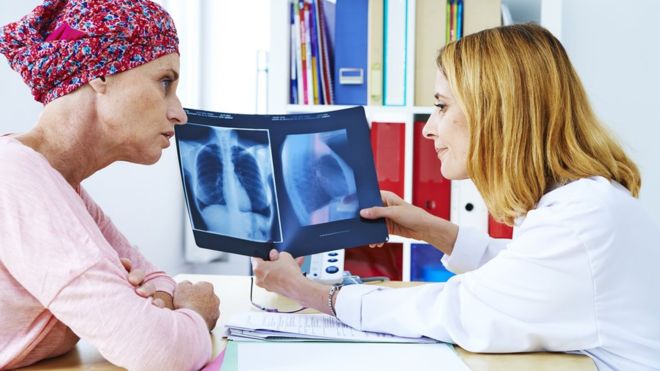
About 70% of women with the most common form of early-stage breast cancer can be spared the “agony of chemotherapy”, researchers say.
It follows trials of a genetic test that analyses the danger of a tumour.
Cancer doctors said the findings would change practice in UK clinics on Monday, and meant women in this group could be treated safely with just surgery and hormone therapy.
Charities said the news, affecting 3,000 UK women a year, was “wonderful”.
Chemotherapy is often used after surgery to reduce the chance of breast cancer spreading or coming back.
It saves lives, but side-effects of the toxic drugs range from vomiting, fatigue and infertility to permanent nerve pain.
In rare cases it can lead to heart failure and leukaemia.
This trial of 10,273 women analysed cancers using a genetic test that is already widely available, including on the NHS.
Currently, women who get a low score on the test are told they do not need chemo, those with a high score are told they definitely do.
But most women get an intermediate result meaning they are unclear as to what to do.
Data presented at the world’s biggest meeting of cancer doctors and scientists in Chicago shows these women have the same survival rates with or without chemo.
The nine-year-survival-rate was 93.9% without chemotherapy and 93.8% with chemotherapy.
‘Fundamental change’
The study, led by the Albert Einstein Cancer Center in New York, is a rare cancer breakthrough as it can save money and instantly change practice.
Dr Alistair Ring, a consultant at the Royal Marsden Hospital in London, told the BBC: “Oncologists have been waiting for these results, it will affect practice on Monday morning.
“It’s a fundamental change in the way we look after women with early breast cancer.
“It’s a great news story.”
He estimates 3,000 women a year in the UK will no longer need chemotherapy because of this trial.
The study is strictly about early stage breast cancers – specifically those that can still be treated with hormone therapy, have not spread to the lymph nodes and do not have the HER2 mutation, which makes them grow more quickly.
Dr Alistair Ring said his practice at the Royal Marsden Hospital will change on Monday as a result of the study
The test is performed on a sample of the tumour when it is removed during surgery.
It works by looking at the activity levels of 21 genes, which are markers of how aggressive the cancer is.
‘Transform care immediately’
Rachel Rawson, from the charity Breast Cancer Care, said: “Every day, women with certain types of breast cancer face the terrible dilemma of whether or not to have the treatment, without hard facts about the benefit for them.
“This life-changing breakthrough is absolutely wonderful news as it could liberate thousands of women from the agony of chemotherapy.”
The findings were presented at the annual meeting of the American Society of Clinical Oncology and published in the New England Journal of Medicine.
Dr Harold Burnstein, from the American Society of Clinical Oncology, said: “This study will transform care immediately, and for the better.”
–
Source: BBC



